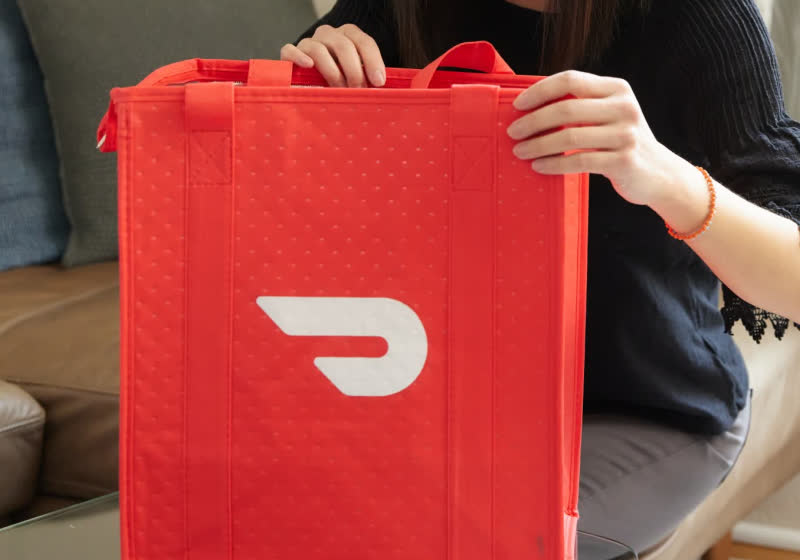Uber Sues DoorDash: Allegations Of Anti-Competitive Practices In Food Delivery Market

Table of Contents
Uber's Key Allegations Against DoorDash
Uber's lawsuit against DoorDash centers around several key allegations of anti-competitive behavior. These accusations paint a picture of a company leveraging its market position to stifle competition and potentially harm consumers.
Exclusive Contracts and Restraint of Trade
Uber claims DoorDash utilizes exclusive contracts with restaurants, preventing them from partnering with competing delivery services like Uber Eats and Grubhub. This alleged restraint of trade severely limits restaurant options and reduces consumer choice.
- Examples: The lawsuit cites specific instances where DoorDash allegedly offered restaurants lucrative deals contingent on exclusivity, effectively locking them out of other platforms.
- Impact on Restaurants: These exclusive contracts leave restaurants vulnerable to DoorDash's pricing policies and commission structures, limiting their ability to negotiate favorable terms.
- Impact on Consumers: Reduced competition leads to less choice, potentially higher prices, and potentially lower quality of service as restaurants are less able to shop around for the best delivery partner.
Predatory Pricing and Market Manipulation
Uber further alleges that DoorDash engages in predatory pricing, temporarily slashing prices below cost to eliminate competitors and then raising prices once rivals are weakened or driven out of the market. This practice is considered a classic anti-competitive tactic.
- Evidence: Uber likely presented data and market analysis to support its claim, showing instances where DoorDash's pricing significantly undercut competitors before returning to higher price points.
- Market Share Impact: DoorDash's alleged predatory pricing strategy is likely designed to maintain and expand its already substantial market share.
- Long-Term Effects: Such tactics, if proven, can significantly harm smaller players and lead to a less competitive market overall, eventually hurting consumers.
Misuse of Data and Algorithmic Manipulation
Uber also alleges that DoorDash misuses its vast data trove to unfairly advantage itself and disadvantage competitors. This could involve manipulating algorithms to prioritize DoorDash deliveries or unfairly penalize rival services.
- Data Exploitation: DoorDash possesses a wealth of data on restaurant locations, delivery routes, and consumer preferences. Uber claims this data is used to unfairly favor DoorDash's own service.
- Algorithmic Bias: Uber suggests DoorDash's algorithms may be designed to prioritize its own drivers and deliveries, potentially slowing down or hindering the efficiency of competing services.
- Industry Precedent: This tactic mirrors concerns raised in other industries about the potential for algorithmic bias to stifle competition and create unfair advantages.
Potential Implications of the Uber DoorDash Lawsuit
The Uber DoorDash lawsuit has significant potential implications, extending far beyond the immediate competitors. The outcome could reshape the food delivery landscape and set important precedents for future antitrust cases.
Impact on the Food Delivery Market
The lawsuit's outcome could dramatically alter the food delivery market. A ruling in Uber's favor might:
- Increase Competition: Force DoorDash to change its practices, opening the market to greater competition from Uber Eats and other players.
- Lower Prices: Lead to more competitive pricing, benefiting consumers through lower delivery fees and potentially lower restaurant prices.
- Enhance Consumer Choice: Increase the number of delivery options available to consumers and enhance the overall quality of service.
Legal Precedents and Future Antitrust Cases
This case sets a significant legal precedent for future antitrust cases, particularly within the tech sector. It highlights the challenges of regulating powerful companies with vast data resources and complex algorithmic systems.
- Antitrust Laws: The lawsuit will involve a thorough examination of relevant antitrust laws and regulations, potentially clarifying their application to the digital marketplace.
- Similar Cases: The outcome will inform future antitrust actions against other dominant tech companies accused of anti-competitive practices.
- Regulatory Impact: It could lead to stronger regulatory oversight and new rules to prevent similar anti-competitive behavior.
Impact on Investors and Stock Prices
The lawsuit has already impacted the stock prices of both Uber and DoorDash, causing uncertainty among investors.
- Market Reaction: The announcement of the lawsuit caused immediate market fluctuations in the share prices of both companies.
- Short-Term Volatility: Uncertainty surrounding the legal proceedings will likely cause continued short-term volatility in both companies' stock prices.
- Long-Term Implications: The final outcome will have long-term implications for investor confidence and the valuation of both companies.
Conclusion
The Uber DoorDash lawsuit represents a pivotal moment in the food delivery industry. The allegations of anti-competitive practices raise serious concerns about fair competition, consumer choice, and the appropriate regulation of powerful tech companies. The outcome will profoundly impact the industry's future, influencing pricing, consumer choice, and the broader discussion surrounding antitrust regulation in the tech world. Staying informed about developments in the Uber DoorDash lawsuit is crucial for anyone interested in the future of the food delivery market. Understanding the complexities of this case is critical to grasping the evolving dynamics of the industry and the legal battles shaping it.

Featured Posts
-
 Xrp Price Prediction Will Xrp Hit 5 After Sec Lawsuit Dismissal
May 08, 2025
Xrp Price Prediction Will Xrp Hit 5 After Sec Lawsuit Dismissal
May 08, 2025 -
 Dwp Doubles Home Visits Thousands Of Benefit Claimants Affected
May 08, 2025
Dwp Doubles Home Visits Thousands Of Benefit Claimants Affected
May 08, 2025 -
 Carneys First D C Meeting Labeling Trump Transformational
May 08, 2025
Carneys First D C Meeting Labeling Trump Transformational
May 08, 2025 -
 The Long Walk Movie Trailer A Chilling Adaptation Of Stephen Kings Novel
May 08, 2025
The Long Walk Movie Trailer A Chilling Adaptation Of Stephen Kings Novel
May 08, 2025 -
 What Did Kyle Kuzma Say About Jayson Tatums Viral Instagram
May 08, 2025
What Did Kyle Kuzma Say About Jayson Tatums Viral Instagram
May 08, 2025
Latest Posts
-
 So Very Fragile Understanding The Developmental Needs Of Young Children And The Daycare Dilemma
May 09, 2025
So Very Fragile Understanding The Developmental Needs Of Young Children And The Daycare Dilemma
May 09, 2025 -
 Is Daycare Too Soon A Parenting Experts Perspective On Infant And Toddler Care
May 09, 2025
Is Daycare Too Soon A Parenting Experts Perspective On Infant And Toddler Care
May 09, 2025 -
 Daycares Impact On Young Children A Critical Analysis By A Parenting Expert
May 09, 2025
Daycares Impact On Young Children A Critical Analysis By A Parenting Expert
May 09, 2025 -
 The Fragility Of Young Children Reconsidering Daycare Placement
May 09, 2025
The Fragility Of Young Children Reconsidering Daycare Placement
May 09, 2025 -
 So Very Fragile A Parenting Expert Explains The Risks Of Early Daycare
May 09, 2025
So Very Fragile A Parenting Expert Explains The Risks Of Early Daycare
May 09, 2025
